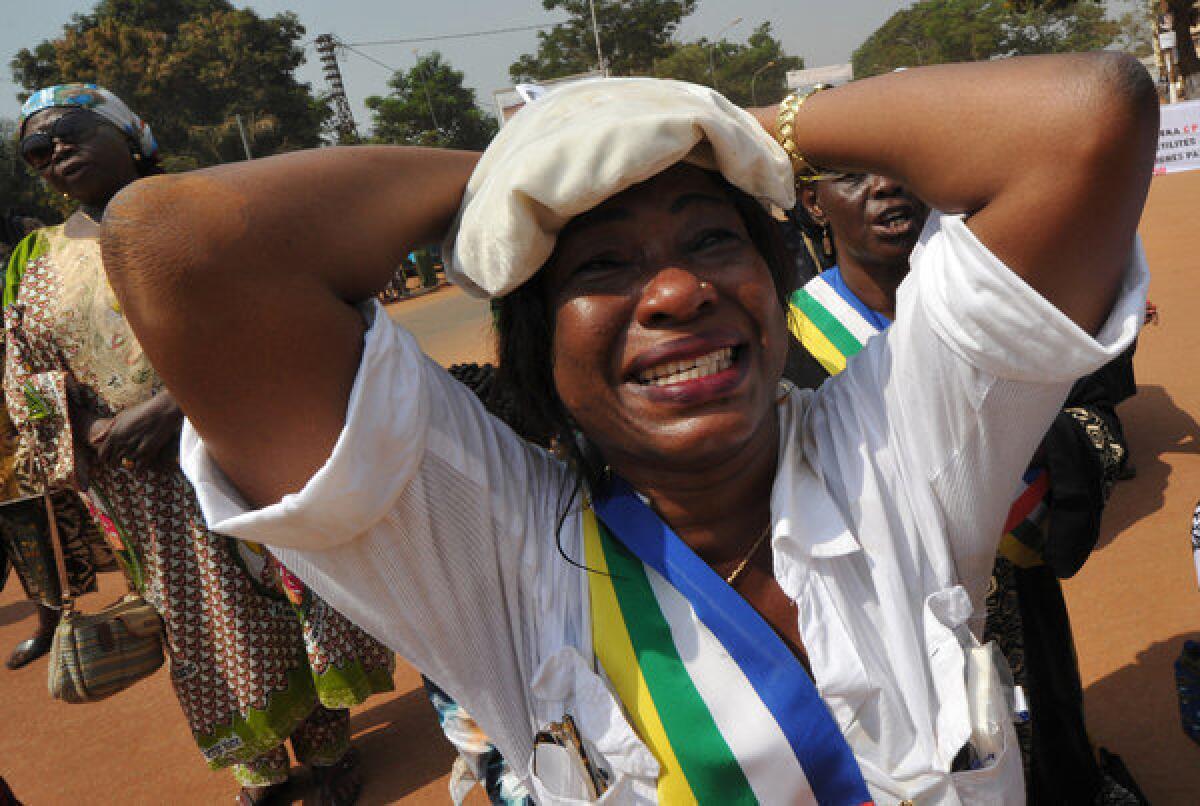U.S. diplomats evacuate Central African Republic as rebels advance

- Share via
JOHANNESBURG, South Africa — U.S. diplomats evacuated from the capital of the Central African Republic on Friday, the State Department reported, after a coalition of rebel groups swept across the country in recent days, seizing towns and diamond mining areas and threatening to oust the government.
Residents of Bangui also fled by car, or by boat across the Ubangi River to the Democratic Republic of Congo, while others scoured markets stocking up on food in case war comes to the capital, according to news agencies.
About 40 Americans were evacuated overnight and flew to Kenya, including diplomats, their families and some private citizens.
The State Department said the evacuation was a temporary suspension of activities, not a break in diplomatic ties, and called for peace talks under the auspices of the Economic Community of Central African States, or ECCAS. The U.S. military has troops in the country to help local forces try to capture Joseph Kony, leader of the notorious Lord’s Resistance Army, who has been indicted for war crimes. U.S. special forces remain in the country, the Associated Press reported.
Officials from the ECCAS arrived Thursday to try to foster talks, and a rebel spokesman told Reuters news service that the coalition of militias that calls itself Seleka, or Alliance, had halted its advance to allow for negotiations with the government.
Nonetheless, there was fighting Friday in Bambari, the Central African Republic’s third-largest city, according to the news service, with reports government troops were back in control after driving back rebels who had held the city for several days.
The rebels accuse President Francois Bozize’s government of breaking peace agreements made from 2007 that called for integrating rebel groups into the army and offering them salaries. Many fear the coalition of rebel militias wants to take power, and the United Nations is also pulling out staff due to concerns that the rebels will attack the capital.
“Our last chance, our only chance, is dialog with the rebels,” Jerome Lega, a bus driver, told Reuters.
The lightning rebel advance indicates how weak, ill-equipped and poorly resourced the country’s military is. Bozize pleaded for help from neighboring Chad, which sent troops to reinforce the government forces. A spokesman for the Central African Republic’s defense ministry, Thierry Zamby, last week told Associated Press that Chad had sent 2,000 troops, a figure that could not be verified.
The fighting comes just after a rebel militia in neighboring Democratic Republic of Congo made similar sweeping advances in recent months, forcing the government there to the negotiating table.
The landlocked Central African Republic, situated in one of the continent’s most volatile neighborhoods, is rich in diamonds, gold, uranium and timber. However, most of its 4.5 million people survive on less than $2 a day.
Sylvain Groulx, the head of mission in Bangui for the humanitarian group Doctors Without Borders, said the health indicators in the country were some of the worst on Earth even before the latest fighting. He said people’s health was at risk after large numbers had to flee their homes and live in the open.
“Essentially what you have is the coping mechanisms people have had for the last 20 years. As soon as they hear a rumor of fighting or the first gunshots, they flee and they stay in their fields next to their crops. They have no shelter; it’s cold at night this time of year; there are mosquitoes; they have no access to clean drinking water and they have whatever food they could gather before they fled.
“What we are noticing with our patients is that they’re coming back with a lot of diarrhea, upper respiratory tract infections, malaria -- everything related to not having shelter and being out in the open without access to clean drinking water.”
In a 2007 report the International Crisis Group said the Central African Republic was worse than a failed state. “It has become virtually a phantom state, lacking any meaningful institutional capacity,” the group said. Little has changed since.
The country languishes close to the bottom of the U.N. development index, undermined by decades of abysmal governance, armed rebellions, battles for control of mineral riches, rampant diamond smuggling, corruption and military coups. Outside of the capital, infrastructure is poor to nonexistent, with roads in a dire state and little evidence of much else.
Armed militias operate with impunity throughout much of the country, where the population often bears the brunt of their atrocities and abuses, including the recruitment of child soldiers. UNICEF has been negotiating with some groups to free child soldiers and has managed to liberate several dozen children in recent months.
On Thursday, Bozize appealed for the colonial power France to help defeat the rebels, as it has before. French President Francois Hollande bluntly rebuffed him, saying those days were over.
The country has been trapped in a seemingly endless cycle of violent struggle; when Bozize seized power in a 2003 coup, it sparked a four-year bush war. Since 2007, several peace agreements have been signed, leading to a government of national unity and presidential elections in 2010 that Bozize won.
The latest violent upheaval has dashed hopes that the country was moving toward greater stability with programs to disarm and demobilize militias.
ALSO:
Russian official: We’re ready to meet with Syrian opposition
Russian ban on U.S. adoptions meant to cast Americans as abusers
South Africa’s Jacob Zuma: Pet dogs are part of ‘white culture’
More to Read
Sign up for Essential California
The most important California stories and recommendations in your inbox every morning.
You may occasionally receive promotional content from the Los Angeles Times.










